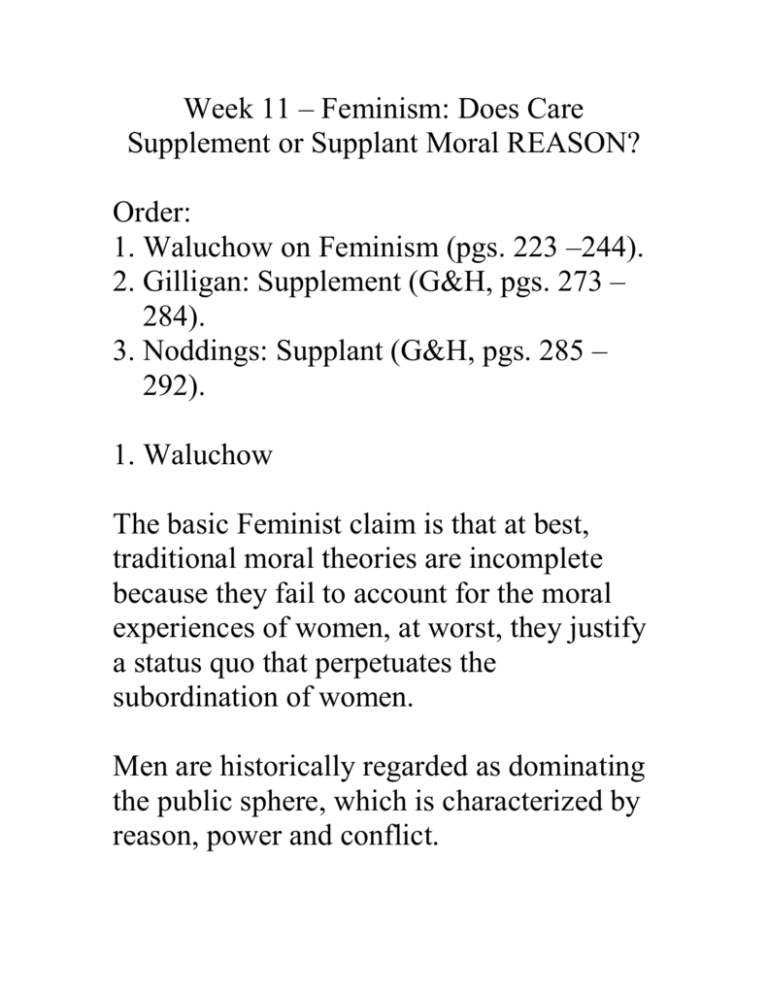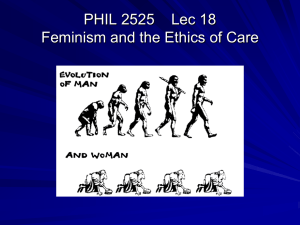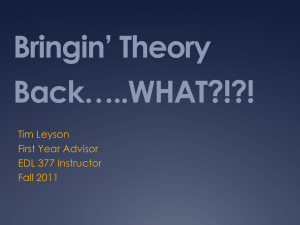Week 11 – Feminism: Does Care Supplement or Supplant Moral
advertisement

Week 11 – Feminism: Does Care Supplement or Supplant Moral REASON? Order: 1. Waluchow on Feminism (pgs. 223 –244). 2. Gilligan: Supplement (G&H, pgs. 273 – 284). 3. Noddings: Supplant (G&H, pgs. 285 – 292). 1. Waluchow The basic Feminist claim is that at best, traditional moral theories are incomplete because they fail to account for the moral experiences of women, at worst, they justify a status quo that perpetuates the subordination of women. Men are historically regarded as dominating the public sphere, which is characterized by reason, power and conflict. Women, by contrast, have been confined to the private sphere, i.e., home life, characterized by intimate caring relationships. This distinction has been justified as ‘natural’ or ordained by God and as such, the further inference that this life satisfies women was made. Feminists typically reject this natural argument; women’s relegation to the private sphere is a matter of convention and is therefore liable to change. Many Feminists also argue that women are still being oppressed, even in Modern Western Democracies. Western Democracies have been designed by men, for men, at the expense of women. The Feminist goal is to root out these ‘patriarchal’ social structures. Of course, while most Feminists share similar goals there are many disparate methods and conclusions among feminists. One of the more prominent discussions revolves around the idea that women have a unique moral perspective that focuses on the caring nature of interpersonal relations. This is the issue we’re going to focus on. The first question we must address is whether women are actually different in nature than men. Few dispute differences between men and women, but most see those differences as a matter of social convention. Hence the distinction between sex, which is biological, and gender, which is a social construct. Most involved in this discussion rely on the social roles of women as those that establish the different ethical perspectives of men and women. Some maintain that the feminine perspective supplements traditional ethical theories, others hold that those traditional theories need to be abandoned in favour of an ‘ethics of care’. Lawrence Kohlberg, a psychologist, introduces a scale of moral development that identifies six stages. Women don’t tend to make it past stage 3. Carol Gilligan, also a psychologist, replies that while she agrees with the differences in moral reasoning between men and women Kohlberg identifies, she does not accept that the ‘higher’ stages are in fact superior. Men appeal to abstract, universal principles, whereas women cite concrete relationships and solutions that require communication and compromise. On Gilligan’s account, the male approach, far from being superior misses an important aspect of our everyday moral lives. Gilligan emphasizes that these differences are simply a function of the Western account of ‘female’, and so do not represent any natural difference between men and women. So for Gilligan, traditional ethical theories need to be amended to capture the complexities of a situated existence, not abandoned. Nel Noddings maintains that while rules and reasoning may have a place in the proper moral theory, the emphasis should be on caring. Universal rules ignore our complex, interdependent lives. Have Gilligan and Noddings provided a legitimate criticism of traditional ethical theories by focusing on their appeal to universal, abstract moral principles? Surely the very idea of ‘universal moral rules’ should not be completely abandoned. Why can’t there be ‘principles of care’? Not every relationship is so unique that it defies comparison and therefore categorization with other similar relationships. Maybe the criticism is of generalization, not universalization… a less general (more specific) rule can (and arguably must) still be applied universally. But few traditional moral theorists deny the importance of taking everyday situations into account. So the idea that universalizability should be rejected cannot be sustained so long as we believe people must use reasons to justify their moral decisions. A broader Feminist criticism of traditional moral theories is that they fail to take the context in which specific choices are made into account. E.g., fertility technology and the cause of a market that seeks it out. 2. Gilligan: Supplementing Traditional Moral theories (G&H, pgs, 273 – 284). Male bias must be identified before equality between women and men can be possible. And the task is difficult because many of our modern male institutions are couched in the language of neutrality. E.g., science, specifically psychology. C: The problem with psychology is that it has identified ‘male’ as ‘normal’ which, by definition, ensures that ‘female’ is regarded as deviant. Women do not have a deficient moral perspective, simply a different one. And the fact that men devalue and ignore the female moral perspective is precisely what leads to the failing of traditional moral theories. Section 1. Men are taken as the norm for psychology. E.g., Freud claims women have a less well developed ego and super-ego. Section 2. pgs. 275 – 278: The goal in this section is to show that the differences between women and men identified by Freud are legitimate, but they do not show women are by nature less well-developed people. The idea is that girls, based on their close relationships with their mothers, are more able to experience empathy. Boys, by contrast, have greater difficulty with interpersonal relationships. And this fact is borne out in the games of young girls and boys. Girls are less interested in rules and conflict, whereas boys seem to enjoy this aspect as much as they enjoy the game itself. Neither of these orientations toward interpersonal relations can be regarded as superior; they are different, and each has its shortcomings. Section 3: pgs. 278 – 280. The tension between the female tendency toward empathy and compromise versus the rule based conflict resolution of males arises from the fact that the male view dominates our social norms. As a result, the female perspective on moral life is devalued and disregarded. Section 4: pgs. 280 – 284. How the dominant male view of morality invades psychology… Kohlberg. His male bias invades his study in the very construction of his account of moral development, i.e., he appeals to males as ‘normal’, and thereby guarantees the inferiority of women. Kohlberg’s results are accurate, it is his interpretation that is flawed. Women appeal to relationships and responsibility not rights. And there is nothing that makes that appeal less valuable. So we need to reconstruct Kohlberg’s stages to allow for the different gender perspectives to be regarded equally. The importance of the feminine can be seen all the way back to Greek mythology. Noddings: Supplanting Traditional Moral theories (pgs. 285 – 292). Take note of Noddings’ rhetorical method – instead of appealing to abstract hypothetical examples as evidence of her position, she presents interpretations of literature, i.e., art, i.e., concrete/complex interpersonal (though perhaps fictional) relationships. What is ‘Caring’, and how is it different from the male perspective? C: Caring can only be understood from the position of the one-caring, typically the female. We do not reason according to abstract principles to lead an actual moral life, but need to be attentive to the emotional bonds we have with those in our lives. Section 1: pgs 285 – 289. The differences between men and women are evident by contrasting Ceres (Demeter) and her reaction to the loss of her daughter against Abraham’s willingness to sacrifice his son. The key to moral life is not the proper rearrangement of abstract principles, but taking steps to actually care for those in your real life. Both men and women are capable of this caring, but it is undervalued in women. Section 2: pgs 290 – 292. A new ethic can be built on women’s experiences… concentric circles of care. Caring most, and being most attentive to those with whom you are immediately surrounded (i.e., family). Then those with whom you interact outside the home. Then those whom you’ll come to meet, and finally, you care for strangers as distinct individuals. The strain on the one-caring will not come from abstract universal rules but internal emotional pressure.






